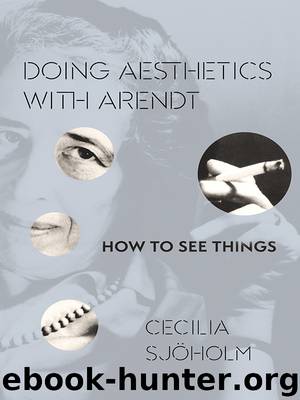Doing Aesthetics with Arendt : How to See Things by Sjöholm Cecilia

Author:Sjöholm, Cecilia
Language: eng
Format: epub
Tags: PHI001000, Philosophy/Aesthetics, ART009000, Art/Criticism & Theory
Publisher: Columbia University Press
Published: 2015-09-07T16:00:00+00:00
THE SPACE OF LAW: INCLUSIONS, EXCLUSIONS
Public interaction, ironically, has historically only been open to select groups. As Arendt herself notes, in ancient Greece the artists themselves (with the possible exception of the poet) were excluded from political participation. They were not recognized as citizens.43 In ancient Athens, women or slaves were not able to move freely in the open, nor were they politically represented. The Greek polis, and the Roman res publica, were physical spaces firmly placed within walls and limits, gathering people in enclosed locations. The walls that cut out the public square are both spatial and legal. Public space has always been a selective institution rather than an open res publica. In the aftermath of the French Revolution, women were barred from appearing not only in politics but also on the streets.44 Public space, then, is an institution of selection rather than an open community. This means that the public realm is immersed in an aporia: neither the inclusion nor the idea of publicness and freedom that it promises will ever be realized.45 Even as the public sphere has become virtual, through the use of new technologies, the barriers remain. Publicness constricts its own borders, construing communities with an inside and an outside at the same time. Every form of exclusion correlates to a constitutive deficiency of the political possibilities of public space.46
Arendt’s model of public space has often been criticized for being agonistic, for presuming the participation of equally strong protagonists.47 It appears as if her faith in public space lacks a critical assessment of its history. Who has been excluded, who has been neglected? Who has made his voice heard, who has been silenced? If public space is to assure the conditioning of freedom, must one not also discuss the conditioning of the excluded? However, Arendt’s concept of freedom does not depend on the social conditioning of the public sphere. The notion of the political can never be relegated to social forms of being. The unintended consequence of her stance, however, is that she ontologizes the question of who is to be allowed in the political sphere and who is to be excluded. For instance, since women have historically been mostly dedicated to the labor that maintains life, the division between animal laborans and zōon politikon becomes gendered.48 All that belongs to the maintenance of life seems to be excluded from the political domain.49
The question of slavery can be seen in this light. Slavery, for Arendt, is not a social but a political condition—understood by the Greeks as a form of victory over corporeal needs. The struggle between slavery and mastery is transposed into labor and action. The laborer is a slave, contrasted with the public sphere of free men.50 Slavery, therefore, is not only a question of repression of individuals and groups or the creation of a subjected being. It is also the making invisible of labor. The conflict lies in the impossibility of defining labor as freedom. Someone who is “free,” then, is someone who is capable of action.
Download
This site does not store any files on its server. We only index and link to content provided by other sites. Please contact the content providers to delete copyright contents if any and email us, we'll remove relevant links or contents immediately.
Ways of Seeing by John Berger(1342)
Rembrandt Drawings by Rembrandt(1166)
The Perfumes The A-Z Guide by Luca Turin(1138)
The Hare with Amber Eyes by Edmund de Waal(1124)
It's Never Too Late to Begin Again by Julia Cameron(1041)
On Photography by Walter Benjamin(971)
Natasha's Dance by Orlando Figes(934)
A Month in Siena by Hisham Matar(902)
The Selected Poetry of Rainer Maria Rilke by Rainer Maria Rilke(871)
Why Architecture Matters by Paul Goldberger(865)
Minor Feelings by Cathy Park Hong(864)
0062259628 by Sarah Strohmeyer(847)
The Death of the Artist by William Deresiewicz(847)
The Sound of Paper by Julia Cameron(838)
0544325265 by Brendan Jones(835)
Citizen: An American Lyric by Claudia Rankine(822)
Proust Was a Neuroscientist by Jonah Lehrer(810)
Perfumes the Guide 2018 by Luca Turin(798)
And Our Faces, My Heart, Brief As Photos by John Berger(759)
